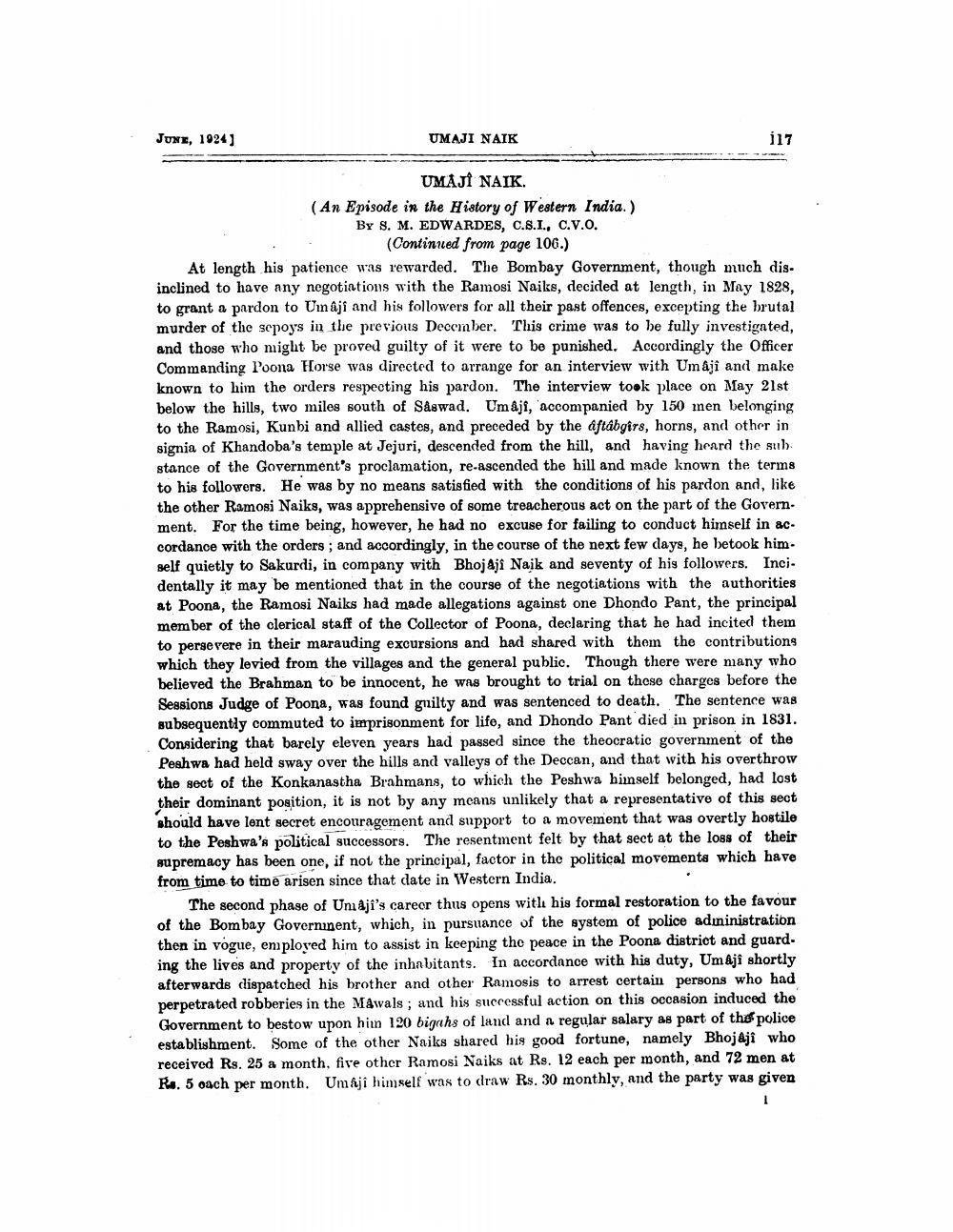________________
JUNE, 1924]
UMAJI NAIK
UMAJI NAIK.
(An Episode in the History of Western India.) By S. M. EDWARDES, C.S.I., C.V.O.
117
(Continued from page 106.)
At length his patience was rewarded. The Bombay Government, though much disinclined to have any negotiations with the Ramosi Naiks, decided at length, in May 1828, to grant a pardon to Umaji and his followers for all their past offences, excepting the brutal murder of the sepoys in the previous December. This crime was to be fully investigated, and those who might be proved guilty of it were to be punished. Accordingly the Officer Commanding Poona Horse was directed to arrange for an interview with Umâji and make known to him the orders respecting his pardon. The interview took place on May 21st below the hills, two miles south of Saswad. Umâjf, accompanied by 150 men belonging to the Ramosi, Kunbi and allied castes, and preceded by the aftâbgirs, horns, and other in signia of Khandoba's temple at Jejuri, descended from the hill, and having heard the sub stance of the Government's proclamation, re-ascended the hill and made known the terms to his followers. He was by no means satisfied with the conditions of his pardon and, like the other Ramosi Naiks, was apprehensive of some treacherous act on the part of the Government. For the time being, however, he had no excuse for failing to conduct himself in accordance with the orders; and accordingly, in the course of the next few days, he betook him. self quietly to Sakurdi, in company with Bhojaji Naik and seventy of his followers. Incidentally it may be mentioned that in the course of the negotiations with the authorities at Poona, the Ramosi Naiks had made allegations against one Dhondo Pant, the principal member of the clerical staff of the Collector of Poona, declaring that he had incited them to persevere in their marauding excursions and had shared with them the contributions which they levied from the villages and the general public. Though there were many who believed the Brahman to be innocent, he was brought to trial on these charges before the Sessions Judge of Poona, was found guilty and was sentenced to death. The sentence was subsequently commuted to imprisonment for life, and Dhondo Pant died in prison in 1831. Considering that barely eleven years had passed since the theocratic government of the Peshwa had held sway over the hills and valleys of the Deccan, and that with his overthrow the sect of the Konkanastha Brahmans, to which the Peshwa himself belonged, had lost their dominant position, it is not by any means unlikely that a representative of this sect should have lent secret encouragement and support to a movement that was overtly hostile to the Peshwa's political successors. The resentment felt by that sect at the loss of their supremacy has been one, if not the principal, factor in the political movements which have from time to time arisen since that date in Western India.
The second phase of Unaji's career thus opens with his formal restoration to the favour of the Bombay Government, which, in pursuance of the system of police administration then in vogue, employed him to assist in keeping the peace in the Poona district and guard. ing the lives and property of the inhabitants. In accordance with his duty, Umâjî shortly afterwards dispatched his brother and other Ramosis to arrest certain persons who had perpetrated robberies in the Mawals; and his successful action on this occasion induced the Government to bestow upon him 120 bigahs of land and a regular salary as part of the police establishment. Some of the other Naiks shared his good fortune, namely Bhojajî who received Rs. 25 a month, five other Ramosi Naiks at Rs. 12 each per month, and 72 men at Rs. 5 each per month. Umaji himself was to draw Rs. 30 monthly, and the party was given
I




